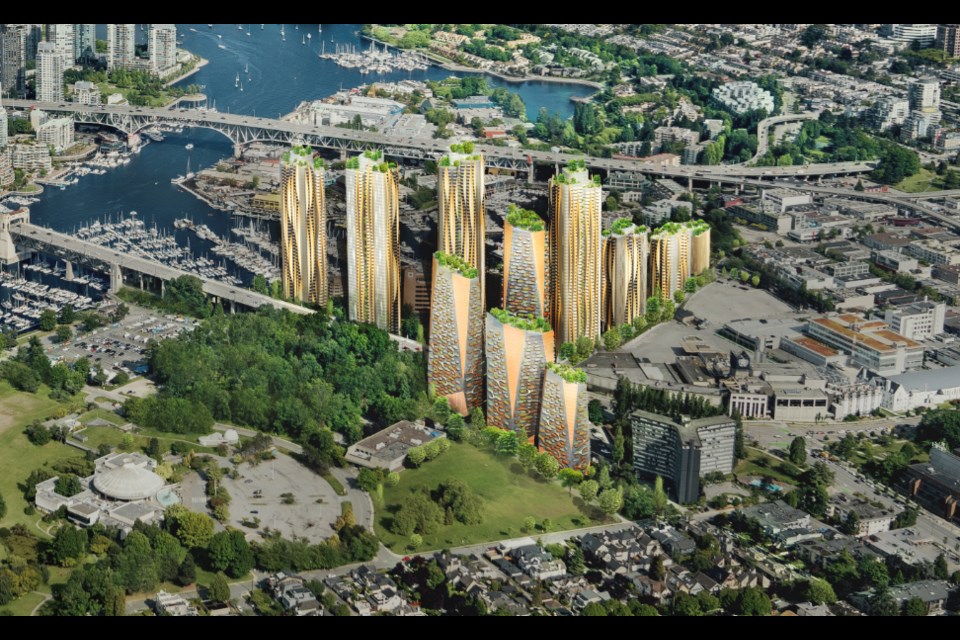Â鶹´«Ã½Ó³»city hall’s landmark agreement to enable construction and provide utilities to the Squamish Nation’s 11-tower condo development around the Burrard Bridge is 250 pages long.
But a government information watchdog said it was published in back-of-the-napkin fashion.
Â鶹´«Ã½Ó³»city hall’s communications department sent two advisories before and one after Mayor Kennedy Stewart signed the agreement May 25 with Squamish Nation council chair Dustin Rivers, a.k.a. Khelsilem. The city’s freedom of information office told a reporter in early July to file another request in mid-August. Then the communications department quietly published the agreement the day after the summer’s last city council meeting, on the Friday of the B.C. Day long weekend.
“It's important that when a government at any level starts working in these types of things, that they are appropriately transparent, and they're not making it up as they go along,” said Jason Woywada, the executive director of the B.C. Freedom of Information and Privacy Association.
“When a public institution can't undertake routine businefss in a routine way, that's where questions start coming up, that’s where trust starts being eroded. Even more tricky when you start getting into elements of reconciliation, appropriate negotiations and the nation-to-nation relationship.”
Squamish Nation members agreed to a 50-50 partnership in 2019 with Westbank Development, which is planning to build up to 6,000 rental units in four phases on Kitsilano Indian Reserve land known as Senakw. By 2029, up to 10,000 people could be living on the 4.7 hectares regained through court settlements.
The heart of the deal is the 40-page contract that spells out how Senakw will connect to the city’s water and storm sewers, sidewalks, roads, bike lanes and public transit. Because it is on reserve land, under the auspices of federal departments, the city’s normal permitting, taxation and user fee collection powers do not apply. The Nation agreed to pay in full for service delivery and lifecycle costs and reimburse the city for costs it incurs.
City hall agreed to notify the Squamish Nation on area work that could impact the construction site, “but that does not fetter in any way city council and the city engineer’s legal rights and duties to manage city streets in the public interest.” Likewise, the Squamish Nation must regularly update the city with its design and construction schedule.
An appendix lists $48.43 million of costs estimated for 15 street, bike lane, sewer and seawall projects, mostly paid by the Nation. Of that, $15 million is the estimate for the Squamish Nation to build a transit hub on the Burrard Bridge.
The agreement was not proactively released, so a freedom of information request filed May 25 led to a July 6 denial letter from city hall’s director of access and privacy.
“Our office has been informed that the agreement is still in draft form and not yet finalized,” wrote Coby Falconer. “In order to ensure we can meet the required statutory deadlines, please re-submit your request for the above records in 30 business days, or once the signing of the agreement has been announced.”
When the contract and appendices were released, the title page stated it was the “final execution version for May 25, 2022 effective date.”
Angela MacKenzie, city hall’s associate director of civic engagement and communications, said the Squamish Nation took the lead on communications and the city hall FOI office was likely not aware of the exact timing of the release.
“When the Nation released the full agreement on their website on July 29, they asked to take the lead on sharing this with media and the public,” MacKenzie said. “The city supported this by creating a corresponding webpage, which was also made public on July 29.”
Regardless of who city hall contracts with, it must follow the Freedom of Information and Protection of Privacy Act. In a 2016 audit, then-Information and Privacy Commissioner Elizabeth Denham found 12th and Cambie was discriminating against media applicants and failing to meet its legal obligation to respond without delay, and process all applications openly, accurately and completely.
Senakw is officially a partnership between Westbank and the Squamish Nation’s Nch’kay Corporation. The North Vancouver-headquartered band’s economic development branch is chaired by Tewanee Joseph, the Indigenous partnerships advisor to the Canadian Olympic Committee’s bid for the 2030 Winter Olympics. Other Nch’kay directors include Mike Magee, who was chief of staff to former Mayor Gregor Robertson, BC Ferries chair Joy MacPhail and Kristen Rivers, a Squamish Nation councillor running for Park Board with OneCity in the Oct. 15 civic election.
An Ernst and Young report commissioned for the project and provided to Squamish Nation members in 2019 estimated Senakw could generate as much as $12.7 billion in cashflow. Westbank is famous for building luxury downtown towers, like the Shaw Tower, Fairmont Pacific Rim, Shangri-La and Telus Garden, and marketing condos for sale in Hong Kong and Singapore. Its latest construction project is the redevelopment of Oakridge Centre for 2,600 units in 10 buildings.



